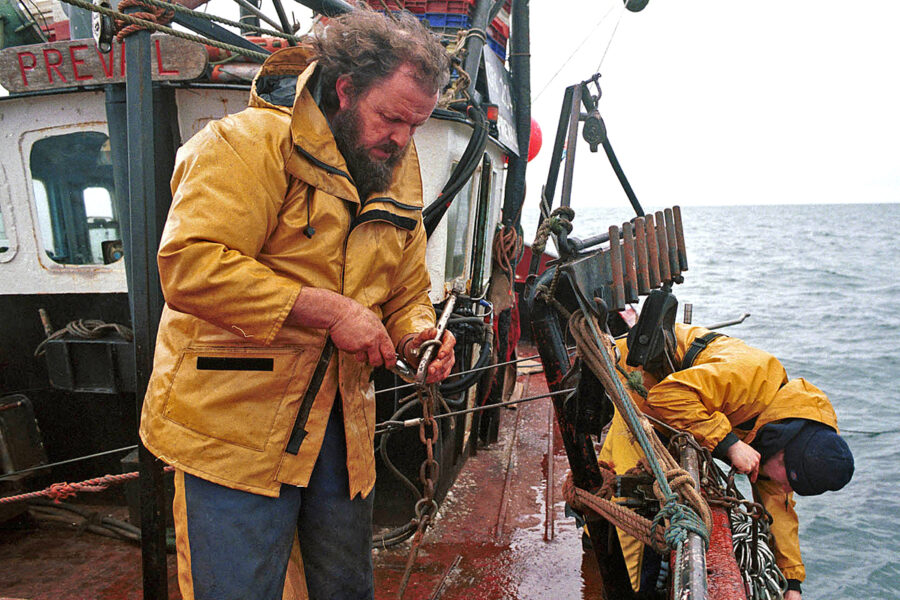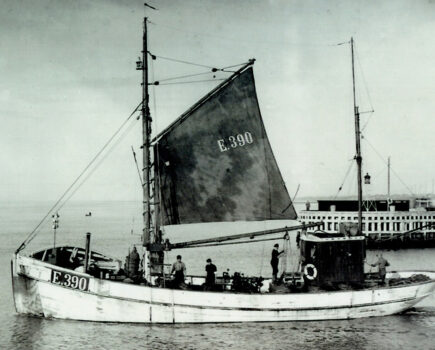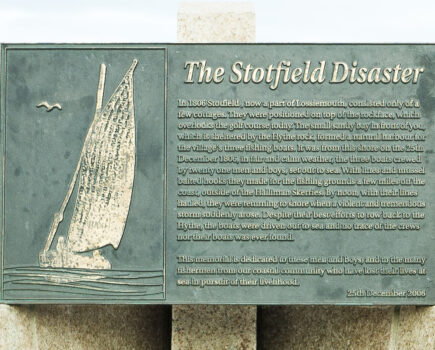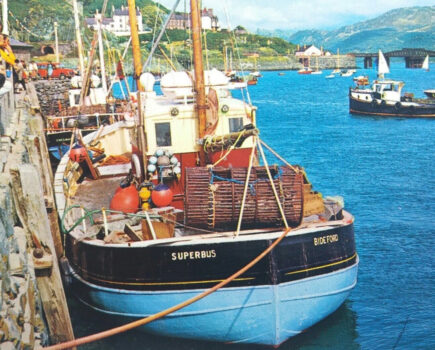After a trip on the Scottish purse seiner Lunar Bow in 1980, years later a Cornish fisherman pioneered the present fishery for Cornish sardines.
Above: By the time he got the Prevail, Nutty Noah continued to develop what became today’s ring netting.
Phil Lockley introduces Andra Noble, a fisherman from Scotland who, some years ago, served considerable time on the Peterhead pelagic boat, Lunar Bow PD 265.
Martin Ellis, ‘Nutty Noah’ of Cadgwith Cove, may not be the most successful of Cornish fishermen, but arguably he is the most famous. Though now retired, and in his younger days a very successful crabber skipper, his escapades in later years, in developing what has become known as the Cornish sardine fishery, were occasionally hilarious and sometimes heart-breaking, as detailed in Jeb Trewin’s film ‘Troubled Waters’.
(Copies of the film on DVD may be bought directly from Martin, either through his website: nuttynoah.co.uk or by contacting him on: 07581356591).
Martin’s interest in sardine fishing arose after a trip from Falmouth, on the Peterhead purse-netter Lunar Bow PD 265 many years ago, to fish mackerel, although he was already aware of the ring-netting carried out in the 1960s and 1970s by Joe and Peter Madron of Mousehole.
Andra Noble, one of the crew of the Lunar Bow at the time, takes up the story.
The Cornish sardine fishery
In the last paragraph of his article, ‘Historic and challenging Cadgwith,’ (Fishing News, 6 October, 2016), Phil Lockley suggests that the present-day fleet of ‘advanced ring netters’ (the phrase ‘a rose by any other name’ comes to mind) may owe the rebirth of their fishery to the feast and famine antics of Cadgwith ex-skipper Martin Ellis – Nutty Noah.
I know Cadgwith, I know Martin Ellis, and I know that the rebirth of that fishery owes virtually everything to his ‘antics’ (Phil’s word, not mine).
Those who mock and criticise Martin should never forget that fact, and when the history of the present-day Cornish sardine fishery comes to be written, the name Martin Ellis should always be remembered.
My story starts back in the days of the far-from-welcome invasion of the fleet of pursers and trawlers – Scots, English and Irish boats among them – to join the southwest winter mackerel fishery off Devon and Cornwall. It took place in the late 1970s and early 1980s of the last century; a world away now.
Fate, chance or providence, call it what you will, brought together the elements of that story then; the Peterhead purser Lunar Bow PD 265, her skipper Jake Buchan and her crew, of whom I was one. (The 111ft purser Lunar Bow was built by Simek Sigbjorn Iversen A/S at Flekkefjord in 1978. Powered by a 1125hp Caterpillar engine, Lunar Bow was lengthened by 20ft in 1979, and a further 6ft (on stern) in 1983. The vessel was sold to Fraserburgh in 1987, and renamed Westward BF 350.)
Early in 1980, having landed our weekly quota of mackerel in Falmouth, and our two sister ships, Vigilant and Pathway, landing theirs in Plymouth, Jake decided to sail and look for pilchards, for which, other than fishmeal, there was then a very limited market.
Shippams was still active in Newlyn then, and bought pilchards from us; pilchards that were carried to Newlyn on two ageing, indeed vintage, matt red painted lorries – owned by the late Jack Reynolds – and driven by Sid and Cecil, his trusted drivers. Cecil, I was delighted to learn very recently, is still alive, though I have no news of Sid.
Somewhere off Dodman Point, skipper Jake Buchan came across a ‘mark’ on the sonar, and called the crew out, lined the mark up, then shot the purse net around the shoal. The shoal was not pilchards, but sprats, as we soon found out, for they hung in the meshes like herring in a drift net. The fore end (bunt) of the net was quickly let go, to allow as many as possible to escape; the oil from the sprats, crushed as the net came in over the Triplex, caused the rollers to lose their grip, even though the chief played the donkey hose on the rollers to help.
Eventually, we got the net hauled, though its bulk was greatly increased with sprats, and we made for Falmouth and attempted to clean it over our two transport rollers – to no avail. Jake arranged for a crane to come down, and with its help, we began cleaning the net onto the pier. Three or four men in blue smocks and jeans came down and watched us; one asked Jake’s permission to look over the Lunar, and they later joined us in the mess deck for a cup of tea. They said they were Cornish fishermen and I asked one of them, George Mitchell, where they fished from. ‘Cadgwith’, he replied. ‘Where’s that?’ I asked, and was told, ‘Down by Lizard Point’.
I asked if there was a harbour there. “No,” replied George, “we come out from of a hole in the cliffs.” We started to clean the net again, and they left, but not before inviting us to Cadgwith on Friday night, for singing in the pub.
Two weekends later, weather-bound in Falmouth, I decided to hire a car so four of us could go down to Cadgwith.
There was then, in Falmouth, a car hire franchise called ‘Rent-a-Wreck’, whose great rivals further up-country were ‘Hire-a-Heap’; I kid you not. I drove the wreck to Cadgwith and, dropping my three shipmates at the pub, eventually found a parking place.
Returning to the packed pub, I found one of the crew talking to George, the other two talking to a stranger who turned out to be Rodney Bewes, a television star in the series Likely Lads, who has a house there, I was told. He was slightly put out that I had no idea who he was.
The singing was amazing; no drunken rabble singing ‘Flower of Scotland’ but unaccompanied four-part male voices singing, for which ‘Friday night at Cadgwith’ is famous. The medley of folk songs, popular songs and hymns entranced us; the words and music of ‘Summer is a Coming’, with the rhythmic beat on the rafters and bar front, was spellbinding, unforgettable and so different to anything we had known.
Later, we followed Cadgwith skippers, Plugger, Dickie Jane and others to the Polbream Hotel for a disco, and, later still, to Ruan Minor, for a ‘nightcap’ in the home of Stevyn Collins, the ‘Mayor’, and his then-wife Pam, before taking the dawn road to Falmouth.
The following week, Stevyn Collins and Martin Ellis sailed with us for a trip to see the purse net in action. Like the Greeks, they came bearing gifts; in Martin’s case, two pigeons (unplucked) he had shot the day before. Putting them in the galley sink, he went on deck; the cook, coming from the messdeck, immediately dumped them in the sea.
Minutes later, the skipper’s Grace (before our supper) was interrupted by Martin crying, ‘who’s nicked me pigeons?’, as he joined us in the mess deck. Later, somewhere off the Scillies, Jake shot the net and we had a haul of 220t of mackerel.
The haul of sprats had, in part, led me to Cadgwith, and eventually, my wife and I bought a house there; that is another story.
That mackerel haul off the Scillies led to the present day Cornish sardine fishery, for that night Martin saw the possibilities for small boats and a pilchard fishery by using ‘the ring net’.
Some years later, after the southwest mackerel fishery was closed to us, I had a telephone call from Martin. Nick Howell (merchant in Newlyn) had assured him of a market for ‘sardines’, and Martin was keen to fish for them and asked me for advice on converting a mullet net to a purse net.
Advising Martin against using the mullet net, I sent him a plan of a purse net and some advice about making a small one, saying I would bring down some old purse netting at Easter, when my wife and I would be in Cadgwith on holiday, and we could make up a net. However, when we got down to Cadgwith, that mullet net had already been converted – by Martin and his two crewmen – and the work had taken place in Stevyn Collins’ net loft in Ruan Minor.
The net was already on Martin’s potter, Samantha Rose; it was ready for shooting. A somewhat Heath Robinson arrangement, involving the conversion of a crabbing winch into a simple purse winch, was in place. A punt skippered by Ian Henn, was engaged as a ‘Bumboat’ for towing the Samantha Rose – which had no side thrusters – out of the net when hauling, and Martin and his crew were raring to go.
The weather improved, and the first ‘ring netter’ was launched off Cadgwith beach, and sailed with her Bumboat around the Lizard into Mount’s Bay, for a couple of practice shots. The sea was calm and clear. When Martin decided to shoot the net, I stood aft, beside him by the wheelhouse, telling him when to give her helm to make the circle as the net was running. Ian lay off, ready to pass the towrope. Martin began to shoot, making a perfect circle back to the dhan.
Ian began to tow us off; I went forward and, looking down from the primitive gallows into the clear depths, saw the leaded rope we had as a ‘pursewire’ coming up perfectly either side of the gallows, and the springclips, acting as purse rings, with their attached ‘strops’ leading perfectly to the footline of the net, as we pursed. The net pursed, we hauled it by hand, pleased with our success; another practice shot, then we would look for fish.
Shooting a second time, unseen by us we had a problem; the running net had snagged on a splinter of wood on the starboard side, and we ‘fanned up’ (net in propeller). Hauling the net as best we could, Ian towed us back to Cadgwith; back on the beach we cut the net out of the fan and patched the damage. That night, the weather broke so we could not sail again; our holidays over, we went back to Scotland.
Days later, a fishery officer spotted the net and told Martin it was illegal, and to cut it up. Undaunted, Martin got another net and later, other boats. Though his venture ended in personal tragedy, as documented in the film Troubled Waters, his vision led to the present southwest sardine fishery; of that, there can be no doubt.
The present-day Scottish pelagic fishery is seen as a great success story, as in many ways it is, though the purse net nowadays plays a much lesser part to the trawl. Often forgotten is the fact that, in the early days of the purse net in Scottish waters, a significant proportion of the early pursers, ‘went to the wall’, their owners giving up completely or going back to other methods of fishing.
Martin may have failed off Cornwall; what should never be forgotten is that today, others benefit from his vision and venture.
Read more features from Fishing News here.








